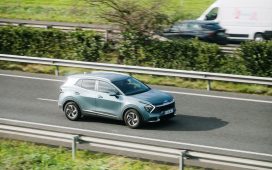Given the Q8’s positioning as a flagship offering within Audi’s Q-series of cars, you would expect the SUV’s cabin to offer something a little extra in terms of visual or material wow factor over and above its maker’s other large vehicles.
Instead, Audi has given the Q8 a cabin that looks and feels pretty much exactly the same as that of any other medium-to-high-ranking model, albeit suitably enlarged to SUV-size proportions.
That Russian-doll-style approach doesn’t mean the Q8 is left wanting in terms of its fit, finish or practicality, though. Brushed metal and gloss-black panelling are used liberally throughout the big Audi’s interior, crafting an ambience that’s entirely upmarket and desirable if also a little sober and clinical. The facelift has also introduced new trims, including attractive grey ash and matt carbon-twill finishes.
Taking up a sizeable amount of dashboard fascia real estate is Audi’s dual-screen MMI infotainment system, which comprises a primary 10.2in screen above a 8.6in unit. The upper screen controls all of the Q8’s features and functions, such as the satellite navigation, vehicle settings and telephone connectivity, while the lower screen is intended to display those features you interact with most often, such as the air conditioning, radio and seat heating.
While these are technically touchscreens, mere contact with the screen won’t necessarily warrant a reaction. Instead, you need to press down rather firmly, almost as if you were using the touchpad on a laptop computer. This can irk. The quality of the graphics, meanwhile, is top-notch and entirely befitting of a flagship SUV.

While the Bang & Olufsen sound system is impressive, the standard offering isn’t sub-par. You could probably make do without the optional kit.
Audi’s Virtual Cockpit also replaces traditional analogue instrument dials as standard. By incorporating the vast majority of vehicle controls within the twin screens, physical dials and buttons are scarce and the result lends the Q8 an interior that feels considerably more minimal than that of a Porsche Cayenne or Mercedes-Benz GLE.
As for practicality, any concerns that the coupé-style roofline will eat into rear head room can be dismissed, because there’s an abundance of space in the back even for taller passengers. As for rear leg room, the Audi curiously doesn’t offer quite as much as the Cayenne despite its lengthier wheelbase.
We measured a typical rear leg room figure of 790mm for the Porsche, while the Audi came in at a still abundant 750mm. Boot volume, meanwhile, is an adequate 605 litres.











